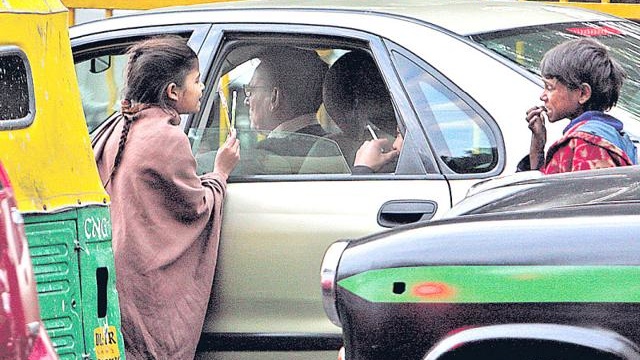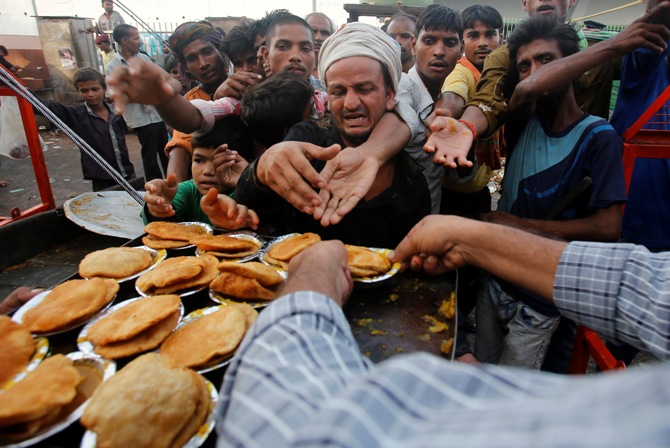Can fragmented realities have a common source and will it be possible to alter the social landscape in a milieu where we refuse to take responsibility- the article explores the several layers of contemporary living and enables us to see the roots of conflict that are breaking us apart.
Nutan Upadhyay is an educationist, working with tribal community of Jharkhand.
When we ourselves display all signs of being indulgent and in lack of control over our own material desires then how can we produce and educate a generation of human beings who are capable of sharing with each other, of ensuring that everyone has access to a minimum standard of living before hoarding selfishly and of leading a life where there is a synchrony between the words that form the ideal or ethical chore of society and the way that one lives in the pragmatic world of real action?

Nothing perhaps in the world can be more tragic than perpetuating a process of socialisation where the child discovers every moment that the adult generations that surround her lead their own lives quite contrary to the ideals that they prescribe to her and when such a situation becomes the central thrust of one’s growth years; what we can surely expect is existential conflict.
A little girl finds that her male guardian for example who drives hurriedly to office from one corner of the city to another advises her to always be a good citizen and follow traffic rules, but she may be stunned to find time and again the swift ways that the power of money/ bribery paves for him each time he drives rashly and the traffic constable catches hold of him, she may grow up in an ambiance where during religious ceremonies and worship everyone around seems to be lost in the spiritual quest but as soon as they see a poor begging child come close they adopt a rude demeanor and chase them away like dogs, they may buy for their own family and friends things beyond necessity but may hesitate to share even a portion of their food with the needy.
Growing up in such a milieu is becoming more and more difficult because the media that we have shaped for our society has also had a major role to play in this ordeal. To understand this phenomenon you really do not have to do much apart from paying a close and critical heed to the content of our advertisements.
We have come across innumerable perfume advertisements where the male protagonist who has made use of the product simply has to glide across his female counterpart to win her over in microseconds, or in the advertisements of beauty and fairness creams we see how simply by becoming fair it is projected that a girl can find a job, buy a house and fulfil her dreams. These days we see advertisements for learning apps and coaching centres and universities too where the emphasis is either on technological proficiency or the availability of air conditioned classrooms and swimming pools in close vicinity. The idea that our primary identity is solely that of a consumer has generated a severe crisis in our civilization – we are living in an age and at a time where we are continuously being lured to buy more, have more and share less.
The ethical principles of community living, the building up of the shared and common society with concern and social justice have all faded in front of the glitz and glamour of the world around that prioritises competition, hierarchy and hoarding .
The ideal consumer is essentially one who is pragmatic, profit-seeking, cold and rational and he cannot afford even once to fall victim to human vulnerability and the plethora of emotions.
Look at the way we are bringing up our children today, in urban centres by the age of two a child attends an all-day crèche being monitored by CCTv cameras, children go to theme parks to get a glimpse of adult occupations and parents are enamoured by the fact that this way they are getting quality exposure to practical adult life, many of our children cannot feel comfortable even in a familiar situation and cannot make conversation because they have not been taught to look beyond their smart gadgets, when people go to a scenic place even before looking around with their own eyes they begin taking selfies for the social media- it is ironic to admit but it seems that there is something fundamentally wrong with the way that our education and socialisation mechanisms seem to be working today.

It is time we wondered if being practical and pragmatic necessary makes us selfish and aloof to the larger concerns of the social. Recently, when the pollution levels in the city rose far beyond the permissible standards, television channels held debates where all that happened was buck passing between the government and the civil society, not once did we contemplate on our over-indulgence and on the need of reducing our own consumer needs and desires. We feel encouraged to donate blankets to the poor through an NGO; we feel happy to donate in order to feed the poor at our religious centres- but would we use the blankets or the food ourselves had we been in that position?
Even in our charity we choose to be miserly, we compromise with quality and thus we compromise with our ethics. Our guilt syndrome is banked upon, the guilt that the middle and upper middle class in India cannot outdo- but what really is the meaning of giving when the gift that we give is anyway rubbish that we would otherwise have thrown away?
I know that the many aspects that I have raised in this piece are sure to disturb many of us who have either not thought about these issues in this manner or have preferred to shun away these questions whenever they have occurred.
But, please understand that the change and transformation that is central to the health of our society at the moment cannot begin from outside. It must always begin with individual transformation, inside our homes and communities. Whether we talk about the commodification and passivity of women projected through advertisements, values of violent hyper-masculinity and aggressiveness or the enhanced marketization of human emotions, educational institutions or interpersonal relationships- we cannot restructure and redefine our work so long as there is a divide between the ethics that we hold dear and the unrestrained, restless and market stimulated life choices we have grown up to worship. What I am primarily suggesting here is the fact that a little baby steps into the world and is immediately put into a crèche for surveillance- care or an old parent is seen as a burden and sent to a desolate old age home, or even the fact that a woman is made to believe that she finds solace or is the happiest when she indulgences in heavy shopping and the myth that if we don’t buy smartphones, cars, gadgets or an education at a foreign university for our children we are making them backward- are not isolated and disconnected realities.
They have everything to do with the conflicted culture that we have built for ourselves and the values that we have cherished.
If we choose to take everything for granted and lead a life disconnected from the whole, if we relish our indulgence and greed, if we fail to look beyond bodily gratification and sensory pleasures, if we allow the market to go on seducing us into a new form of slavery – we shall never be at peace with ourselves or with the world around is. If anything ever is to change, it shall change from me and from you.
The New Leam has no external source of funding. For retaining its uniqueness, its high quality, its distinctive philosophy we wish to reduce the degree of dependence on corporate funding. We believe that if individuals like you come forward and SUPPORT THIS ENDEAVOR can make the magazine self-reliant in a very innovative way.














